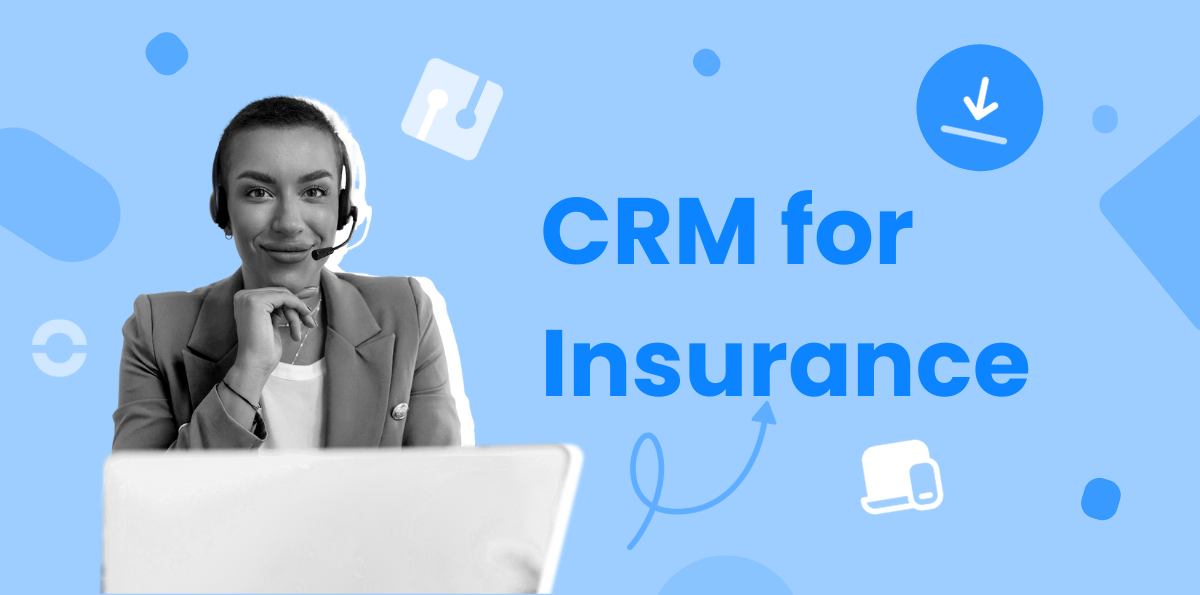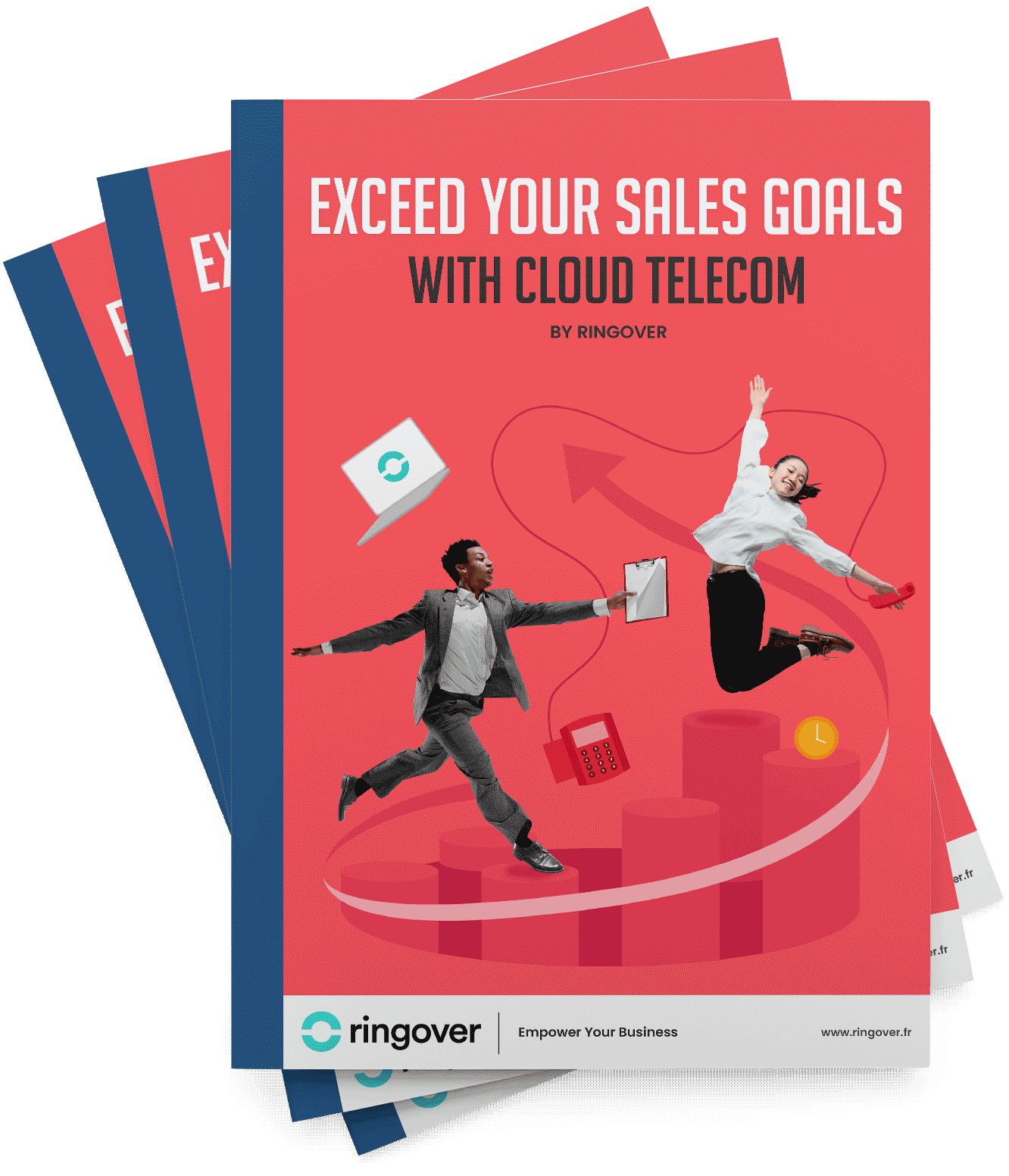Summary
CRM for insurance brokers is a tailored software solution designed to help you effectively organise, track, and communicate with your leads, clients, and partners. It simplifies task automation, streamlines workflows, and provides valuable insights to foster business growth.
Discover Ringover
Implementing a CRM can significantly ease your workload and enhance customer satisfaction. However, it's crucial to understand that not all CRM software is created equally. While some may be overly generic, others might be excessively complex or steeply priced.
So, how do you select the ideal CRM for your insurance brokerage? This article aims to introduce you to the top 5 CRMs for insurance brokers, evaluating them based on their features, pricing, and ease of use. Additionally, we'll delve into the basics of CRM for insurance, its necessity, and how it stands apart from AMS (Agency Management Systems).
Table: 5 Best CRM For Insurance Brokers
| CRM for Insurance Name | Description | Key Features |
|---|---|---|
| HubSpot CRM | This no-cost, robust CRM system enables efficient management of contacts, deals, tasks, and emails all in a single interface. | Unlimited users and data storage, email tracking and templates, live chat and chatbots, marketing and sales automation, reporting and analytics |
| Better Agency | Designed specifically for insurance agents, this CRM tool streamlines sales and service processes while boosting retention and referrals. | Pre-built campaigns for personal and commercial lines, policy management and renewal tracking, text messaging and video proposals, integration with Zapier, Google Calendar, and VoIP tools, performance dashboard and leaderboards |
| Zoho CRM | A versatile and scalable CRM solution, Zoho CRM facilitates comprehensive management of leads, clients, and partners across various channels and devices. | Lead generation and qualification, workflow automation and AI assistant, multi-channel communication and collaboration, customer segmentation and loyalty programs, advanced analytics and forecasting |
| Zendesk Sell | Zendesk Sell offers a user-friendly and mobile-optimised CRM experience, simplifying sales pipeline management and enhancing engagement with prospects and customers. | Smart lists and filters, call recording and logging, email integration and tracking, sales goals and performance reports, integration with Zendesk Support and Chat |
| Salesforce | Salesforce delivers a comprehensive, cloud-based CRM platform, empowering businesses to effectively manage the entire customer lifecycle and accelerate growth. | Contact and account management, opportunity and quote management, lead and referral management, marketing and service cloud, financial services cloud |
List: Top 5 CRM for Insurance
1. HubSpot CRM
HubSpot CRM stands out as a free, yet potent CRM solution that consolidates your contacts, deals, tasks, and emails in one location. It's further enriched with a collection of marketing and sales tools designed to attract, engage, and please your prospects and customers. HubSpot CRM is perfectly suited for insurance brokers aiming to expand their business through inbound marketing and sales techniques. Plus, Hubspot and Ringover have a native interaction that makes it easy to connect the two software, allowing for increased efficiency.
Hubspot Advantages✅
- Free for unlimited users and data storage
- Includes professional email tracking and templates for efficient lead and client follow-ups
- Features live chat and chatbots for instant, personalised service
- Offers marketing and sales automation for nurturing leads and securing more deals
- Provides reporting and analytics for performance measurement and enhancement
Hubspot Disadvantages❌
- May be overwhelming for beginners due to its extensive features and options
- Upgrading to paid plans for advanced features can be costly
- Integration with some third-party tools and platforms can be challenging
2. Better Agency
Tailored for insurance agents, Better Agency automates sales and service processes, enhancing retention and referrals. It simplifies policy and renewal management and facilitates communication with leads and clients through text and video. Better Agency is ideal for brokers looking for time and cost savings via pre-built campaigns and workflows for various insurance lines.
Better Agency Advantages✅
- Features pre-built campaigns for different insurance products and scenarios
- Includes policy management and renewal tracking for client retention and revenue growth
- Supports text messaging and video proposals for effective and persuasive communication
- Integrates with popular tools like Zapier, Google Calendar, and VoIP phone
- Equipped with a performance dashboard and leaderboards for team monitoring and motivation
Better Agency Disadvantages❌
- Not free, with a monthly fee per user
- Limited customization and flexibility in campaigns and workflows
- Restricted reporting and analytics capabilities
3. Zoho CRM
Zoho CRM offers a customizable and scalable solution for managing leads, clients, and partners across multiple channels and devices. With features like task automation and artificial intelligence, it enhances sales and service efficiency. Zoho CRM is best for insurance brokers seeking greater control and flexibility over their CRM software and processes. You can also take advantage of a native integration with Ringover to improve your data synchronisation and increase efficiency.
Zoho CRM Advantages✅
- Includes lead generation and qualification tools for identifying and prioritising prospects
- Features workflow automation and an AI assistant for streamlined sales and service activities
- Supports multi-channel communication and collaboration
- Offers customer segmentation and loyalty programs for targeting and rewarding top customers
- Provides advanced analytics and forecasting tools for sales and service outcome analysis and prediction
Zoho CRM Disadvantages❌
- May be complex and confusing due to its extensive features and options
- Accessing higher-tier plans and features can be costly
- Integrating with some third-party tools and platforms can be challenging
4. Zendesk Sell
Known for its simplicity and mobile-friendliness, Zendesk Sell streamlines the sales pipeline and effectively engages prospects and customers. It aids in managing calls and emails, and in tracking sales goals and performance–features that you can easily enhance by integrating the software with a business phone system like Ringover. Zendesk Sell is the go-to CRM for insurance brokers desiring a straightforward, intuitive system that performs seamlessly across devices.
Zendesk Sell Advantages✅
- Features smart lists and filters for organising and prioritising leads and deals
- Includes call recording and logging for conversation capture and review
- Supports email integration and tracking for synced and monitored communications
- Offers sales goals and performance reports for target setting and achievement
- Integrates with Zendesk Support and Chat for consistent and seamless service
Zendesk Sell Disadvantages❌
- Not free, with a monthly fee per user
- Limited customization and flexibility in sales pipeline and processes
- Restricted marketing and service features
5. Salesforce
As a comprehensive, cloud-based CRM, Salesforce manages the entire customer journey, fostering faster business growth. It provides a suite of cloud solutions for marketing, service, and financial services, along with a platform for custom application development. Salesforce is suited for insurance brokers needing a robust, versatile CRM capable of supporting complex, large-scale business operations.
Salesforce Advantages✅
- Offers contact and account management tools for easy customer data access and storage
- Includes opportunity and quote management tools for deal creation and closure
- Features lead and referral management tools for prospect generation and conversion
- Provides marketing and service cloud solutions for customer attraction and retention
- Equipped with a financial services cloud solution for insurance policy and product management
Salesforce Disadvantages❌
- Expensive, with a monthly fee per user
- Complex, requiring training and support for effective use
- Customization and integration with some third-party tools and platforms can be difficult
What is CRM for insurance?
CRM, or Customer Relationship Management, is a software solution pivotal for businesses in managing interactions with customers and potential clients. Specifically, CRM for insurance is tailored to meet the unique requirements and challenges faced by the insurance sector.
This specialised CRM aids insurance brokers in organising, tracking, and maintaining communication with their leads, clients, and partners. Additionally, it streamlines task automation, workflow optimization, and the generation of insights critical for business expansion.
By leveraging CRM for insurance, brokers can significantly enhance their productivity and simplify their professional routines.
The advantages of employing CRM for insurance include:
- Efficient capture and qualification of leads from diverse channels, including web forms, referrals, and social selling.
- Enhanced management of the sales pipeline, ensuring timely and relevant follow-ups with leads and clients.
- Centralised storage and easy retrieval of customer information, such as contact details, policy specifics, renewal dates, and more.
- Automation of sales and service operations, including the dispatch of quotes, proposals, invoices, and reminders.
- Provision of superior customer service and support by facilitating query resolution, issue management, feedback collection, and more.
- Creation and management of marketing campaigns across various platforms, such as email, text message, and social media.
- Capability to monitor and refine performance metrics, including sales targets, conversion rates, and customer satisfaction levels.
The Importance of Integrating CRM for Insurance With Other Software
For insurance brokerages, the integration of CRM software with your business system represents a strategic enhancement. This fusion facilitates a unified solution for communication and data management, significantly elevating efficiency, productivity, and customer satisfaction.
Key benefits of CRM and IP telephony integration include:
- Having click-to-call available on the CRM interface, streamlining operations.
- Enhanced customer data access and update functionalities during or after calls, promoting data accuracy and consistency.
- Automated call logging, recording, and transcription processes, reducing manual tasks and offering insightful data.
- Improved customer service and support, enabling personalised interactions and faster issue resolution.
- Boosted sales performance and conversion rates through efficient lead management and deal closure.
Ringover stands out as an exemplary VoIP phone for CRM integration. This cloud-based platform supports advanced features for managing calls, video conferences, text messaging, and fax. It's compatible with leading CRM software like Salesforce, Zoho, Hubspot, Pipedrive, and Sellsy, allowing for a hassle-free setup.
Experience the full spectrum of Ringover's capabilities directly within your CRM interface, thanks to a simple integration process.
Benefits specific to insurance brokers from Ringover include:
- Unlimited calling to over 110 destinations and numbers available from over 65 locations, facilitating global customer support and local presence for sales teams.
- Seamless call transition to mobile apps, supporting uninterrupted conversations.
- Efficient voicemail drop and calling campaign tools, enhancing productivity and outreach.
What is the difference between CRM and AMS?
If you're an insurance broker, you've likely come across the acronyms CRM and AMS, but might be unclear about what they stand for and how they're distinct. CRM refers to Customer Relationship Management, while AMS stands for Association Management System. Though both are software solutions designed to streamline your data management and interactions with customers and prospects, their purposes and functionalities diverge significantly.
A CRM software focuses on fostering and maintaining robust customer relationships, aiming to boost your revenue and business growth. It equips you with a variety of tools for managing sales, marketing, and service tasks, including lead generation, qualification, follow-up, communication, automation, analytics, and more. Essentially, CRM software is your ally in attracting, engaging, and satisfying customers, thereby enhancing retention and referrals.
Conversely, an AMS software is tailored to the operational management of your association and meeting your members' needs. It offers functionalities for handling membership, events, donations, committees, chapters, and similar aspects. With an AMS, processing membership applications and renewals, collecting dues and donations, event registration, and managing committees and chapters become streamlined processes.
The primary distinction between CRM and AMS software lies in the nature and scope of data they collect and manage. CRM software is designed to strengthen customer relationships and grow your business by leveraging data analytics. On the other hand, AMS software focuses on facilitating association management and supporting the daily tasks of your staff and members.
Another key difference is the level of customization and flexibility provided. CRM software typically offers greater customization and adaptability, allowing you to adjust the system according to your specific business needs and preferences. In contrast, AMS software tends to be more standardised, featuring a set of pre-defined functionalities tailored for association management.
Ultimately, the choice between CRM and AMS software depends on your specific goals and challenges. The following section will guide you in selecting the most suitable CRM or AMS software for your insurance brokerage needs.
Eliminate tiresome, repetitive data entry by integrating your CRM for insurance and your VoIP phone.
Conclusion
We've delved into the essence of CRM for insurance, its necessity for integration with your IP telephony system, and its distinction from AMS. Our aim was to equip you with a thorough understanding of the advantages and hurdles of adopting CRM software in your insurance brokerage, guiding you towards making an informed decision that aligns with your requirements and financial plan.
As you consider your CRM for insurance brokers options, don't forget to take into account whether or not it has an integration available with Ringover. This integration promises a unified platform for effortless communication and streamlined data management. See for yourself by starting a free trial today!




